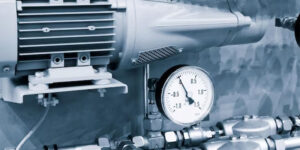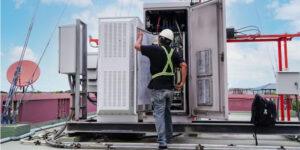A Beginner’s Guide to Identifying and Replacing Key HVAC Parts
Proper maintenance and timely replacement of HVAC parts are crucial for ensuring the efficiency and longevity of commercial and industrial heating, ventilation, and air conditioning systems. These systems are vital for maintaining a comfortable and controlled environment, making it essential to understand how they operate and how to address component issues when they arise. This guide will walk you through the basics of identifying and replacing key HVAC parts, enabling you to maintain your system’s performance effectively.
For expert assistance with commercial and industrial HVAC systems, contact Alliance Comfort Systems, Inc. at +1 502 384 8500 or email us at ACS.receptionist@AllianceComfortSys.com. You can also visit our office at 7200 Distribution Dr, Louisville, KY 40258.
Why Understanding HVAC Parts is Important
Commercial and industrial HVAC systems are complex and consist of numerous interconnected components that work together to regulate air temperature, quality, and circulation. Familiarizing yourself with these parts helps you:
- Diagnose Issues Quickly: Identifying faulty components reduces downtime.
- Ensure Timely Replacement: Replacing worn parts promptly prevents further damage.
- Enhance Efficiency: Well-maintained systems use energy more efficiently, lowering operational costs.
- Prolong System Life: Proper care extends the lifespan of your HVAC equipment.
Key HVAC Parts and Their Functions
Understanding the critical components of your HVAC system is the first step in identifying and replacing faulty parts. Below is an overview of the most essential HVAC parts and their roles:
1. Compressors
The compressor is the heart of any HVAC system, responsible for circulating refrigerant between the evaporator and condenser coils. Without a functioning compressor, your system cannot effectively cool or heat your facility.
Signs of Issues:
- Unusual noises (e.g., rattling, clicking).
- Insufficient cooling or heating.
- System frequently cycles on and off.
Replacement Tips:
When replacing a compressor, ensure compatibility with your system’s specifications. Consult professionals for installation to avoid errors.
2. Condenser Coils
Condenser coils release heat absorbed from the air during the cooling process. Dirty or damaged coils can reduce system efficiency.
Signs of Issues:
- Overheating HVAC unit.
- Reduced cooling efficiency.
- Visible dirt, grime, or damage.
Replacement Tips:
Regularly clean coils to extend their lifespan. Replace damaged coils with high-quality replacements designed for industrial use.
3. Evaporator Coils
Evaporator coils absorb heat from the air to facilitate cooling. These coils are prone to freezing or leaks when not properly maintained.
Signs of Issues:
- Ice buildup.
- Poor airflow.
- Increased energy consumption.
Replacement Tips:
Use genuine replacements to maintain compatibility with your HVAC system.
4. Filters
Filters trap dust, debris, and other particles, ensuring clean airflow and protecting other HVAC components.
Signs of Issues:
- Reduced airflow.
- Dust accumulation around vents.
- Frequent overheating of the system.
Replacement Tips:
Replace filters regularly—monthly in high-demand seasons. Choose filters with the appropriate MERV rating for your facility.
5. Blower Motors
Blower motors circulate air throughout the HVAC system. They are critical for maintaining consistent airflow.
Signs of Issues:
- Weak airflow.
- Unusual humming or grinding noises.
- System fails to start.
Replacement Tips:
Ensure the replacement motor matches the original’s horsepower and voltage requirements.
6. Thermostats and Control Panels
Thermostats regulate temperature settings, while control panels manage the overall functionality of the HVAC system.
Signs of Issues:
- Inconsistent temperature control.
- System unresponsive to commands.
- Error messages on the control panel.
Replacement Tips:
Upgrade to programmable or smart thermostats for greater control and energy efficiency.
7. Ductwork
Ductwork distributes conditioned air throughout your facility. Leaky or poorly insulated ducts can cause significant energy loss.
Signs of Issues:
- Uneven temperatures.
- High energy bills.
- Whistling or hissing sounds.
Replacement Tips:
Use durable, insulated materials for duct replacements to maximize efficiency.
How to Identify Faulty HVAC Parts
Diagnosing issues with your HVAC system requires a combination of observation and technical knowledge. Follow these steps to identify faulty HVAC parts:
1. Observe System Performance
Monitor your HVAC system for signs of inefficiency, such as uneven temperatures, increased energy usage, or frequent breakdowns.
2. Listen for Unusual Noises
Unusual sounds, such as banging, grinding, or hissing, can indicate issues with specific components like the blower motor or refrigerant lines.
3. Check for Visible Damage
Inspect components for signs of wear, such as rust, cracks, or leaks.
4. Use Diagnostic Tools
Advanced diagnostic tools, such as multimeters and refrigerant pressure gauges, can help pinpoint issues accurately.
5. Consult Professionals
When in doubt, enlist the help of HVAC specialists to perform a thorough inspection and identify faulty parts.
Steps to Replace Key HVAC Parts
Once you’ve identified the need for a replacement, follow these steps to ensure a successful installation:
1. Shut Down the System
Before starting any replacement, turn off the HVAC system and disconnect power to ensure safety.
2. Obtain the Correct Replacement Part
Verify the model number and specifications of the faulty component to ensure compatibility.
3. Prepare Necessary Tools
Gather tools like wrenches, screwdrivers, and diagnostic equipment for the replacement process.
4. Follow Manufacturer Instructions
Adhere to the manufacturer’s guidelines for proper installation to avoid damaging the new part or the system.
5. Test the System
After installation, power on the system and test its performance to ensure the replacement part is functioning correctly.
6. Schedule Follow-Up Maintenance
Regular maintenance checks can help verify that the new component is operating efficiently.
Why Choose Alliance Comfort Systems, Inc.
At Alliance Comfort Systems, Inc., we specialize in providing top-notch HVAC solutions for commercial and industrial facilities. Here’s why you should trust us for all your HVAC needs:
1. Extensive Expertise
Our team has years of experience in servicing commercial and industrial HVAC systems, ensuring reliable and professional assistance.
2. Quality Parts
We provide premium-quality HVAC parts tailored to the rigorous demands of large-scale systems.
3. Customized Solutions
We understand that each facility has unique requirements, and we offer tailored solutions to meet those needs.
4. Unmatched Customer Support
From selecting the right parts to installation and maintenance, we’re here to guide you every step of the way.
For assistance, call us at +1 502 384 8500, email ACS.receptionist@AllianceComfortSys.com, or visit us at 7200 Distribution Dr, Louisville, KY 40258.
Preventative Maintenance Tips
To minimize the need for replacements and maximize the performance of your HVAC system, implement these preventative maintenance practices:
- Schedule Regular Inspections: Periodic checks help identify potential issues early.
- Clean Components: Dust and debris can compromise efficiency; clean coils, fans, and filters regularly.
- Monitor Energy Usage: Sudden spikes in energy consumption may indicate component issues.
- Replace Worn Parts Promptly: Timely replacements prevent further damage.
- Work with Professionals: Partner with experienced technicians for maintenance and repairs.
Understanding and maintaining your HVAC system is essential for ensuring its efficiency, reliability, and longevity. By familiarizing yourself with the key HVAC parts and knowing how to identify and replace faulty components, you can avoid costly downtime and ensure consistent performance.
For expert support with your commercial or industrial HVAC system, contact Alliance Comfort Systems, Inc. at +1 502 384 8500, email ACS.receptionist@AllianceComfortSys.com, or visit us at 7200 Distribution Dr, Louisville, KY 40258. Our team is dedicated to keeping your HVAC system running smoothly, allowing you to focus on your business operations.
HVAC Parts: Top 10 Must-Have Components for Reliable Heating and Cooling Systems
For commercial and industrial facilities, reliable heating, ventilation, and air conditioning (HVAC) systems are essential to maintaining a comfortable and controlled environment. A well-functioning HVAC system depends on the quality and condition of its parts. Whether it’s maintaining the right temperature or ensuring energy efficiency, having the right HVAC parts in place is crucial. This guide will explore the top 10 must-have components for reliable heating and cooling systems, helping you understand their importance and how they contribute to optimal system performance.
For expert guidance, premium-quality components, and maintenance services tailored to commercial and industrial needs, contact Alliance Comfort Systems, Inc. at +1 502 384 8500, email ACS.receptionist@AllianceComfortSys.com, or visit us at 7200 Distribution Dr, Louisville, KY 40258.
1. Compressors: The Heart of HVAC Systems
Compressors play a vital role in your HVAC system by circulating refrigerant between the evaporator and condenser coils. Acting as the heart of your HVAC unit, a malfunctioning compressor can cause the entire system to fail.
Why It’s a Must-Have:
- Ensures effective temperature regulation.
- Critical for the refrigeration cycle in cooling systems.
Maintenance Tips:
Regular inspections can prevent issues such as refrigerant leaks and overheating. Replace compressors with high-quality HVAC parts designed for industrial usage to avoid frequent breakdowns.
2. Condenser Coils: Efficient Heat Transfer
Condenser coils expel heat absorbed from the air during the cooling process. These components are essential for maintaining energy efficiency and ensuring a steady cooling capacity.
Why It’s a Must-Have:
- Facilitates the heat exchange process.
- Helps maintain consistent system performance.
Maintenance Tips:
Keep coils clean and free of debris to avoid reduced cooling efficiency. Replace damaged coils promptly to maintain system performance.
3. Evaporator Coils: Cooling Essentials
Evaporator coils absorb heat from the air and cool it before distributing it through your facility. These coils are integral to maintaining a comfortable indoor environment.
Why It’s a Must-Have:
- Essential for air cooling.
- Supports efficient dehumidification.
Maintenance Tips:
Inspect for frost buildup and clean coils regularly to prevent clogs. Use compatible replacement parts to avoid system inefficiencies.
4. Air Filters: Clean Air, Better Efficiency
Air filters protect your HVAC system from dust, dirt, and debris, ensuring clean air circulation and preventing component wear.
Why It’s a Must-Have:
- Improves indoor air quality.
- Protects other HVAC parts from damage caused by debris.
Maintenance Tips:
Replace filters monthly or as needed, especially during high-demand periods. Choose filters with an appropriate MERV rating for industrial applications.
5. Blower Motors: Circulating Air Effectively
Blower motors are responsible for moving air through your HVAC system. They play a crucial role in delivering heated or cooled air to various parts of your facility.
Why It’s a Must-Have:
- Ensures proper air circulation.
- Helps maintain consistent temperatures.
Maintenance Tips:
Regularly check for unusual noises or performance drops. Replace motors with high-efficiency options for better energy savings.
6. Thermostats and Controls: Precision in Climate Control
Thermostats and control panels are the brains of your HVAC system, allowing you to set and maintain desired temperature levels.
Why It’s a Must-Have:
- Offers precise temperature management.
- Enhances energy efficiency through advanced settings.
Maintenance Tips:
Upgrade to programmable or smart thermostats to reduce energy costs and improve control over your HVAC system.
7. Heat Exchangers: Reliable Heating
Heat exchangers transfer heat from one medium to another, ensuring efficient heating for your facility. They are commonly used in furnaces and other heating systems.
Why It’s a Must-Have:
- Delivers consistent heating performance.
- Reduces energy waste by improving heat transfer efficiency.
Maintenance Tips:
Inspect for cracks or corrosion during routine maintenance. Replace worn-out heat exchangers to prevent safety hazards like carbon monoxide leaks.
8. Fans and Ventilation Components
Fans are critical for moving air through the system, whether for ventilation, cooling, or heating. Properly functioning fans ensure even distribution of air across large spaces.
Why It’s a Must-Have:
- Enhances airflow and system efficiency.
- Prevents stagnant air and uneven temperature zones.
Maintenance Tips:
Lubricate fan motors regularly and check for loose or damaged blades. Use industrial-grade HVAC parts for replacements.
9. Expansion Valves: Regulating Refrigerant Flow
Expansion valves control the flow of refrigerant into the evaporator coils, playing a pivotal role in maintaining the cooling process.
Why It’s a Must-Have:
- Ensures optimal cooling performance.
- Prevents freezing or overheating in the system.
Maintenance Tips:
Regularly check for signs of blockages or leaks. Replace faulty valves with precision-engineered parts to maintain system efficiency.
10. Ductwork: Delivering Air Across the Facility
Ductwork serves as the pathway for delivering conditioned air throughout your commercial or industrial space. Poorly designed or leaky ducts can compromise system performance.
Why It’s a Must-Have:
- Ensures even air distribution.
- Reduces energy loss and enhances system efficiency.
Maintenance Tips:
Inspect ductwork for leaks, and seal or replace sections as necessary. Use insulated materials for better energy conservation.
Benefits of Using High-Quality HVAC Parts
Investing in premium-quality HVAC parts offers several advantages, including:
- Enhanced System Reliability: Quality components reduce the risk of unexpected breakdowns.
- Improved Energy Efficiency: High-grade parts contribute to lower energy consumption.
- Longer Equipment Lifespan: Durable parts minimize wear and tear, extending system longevity.
- Cost Savings: Fewer repairs and replacements result in reduced maintenance costs.
- Better Performance: Reliable components ensure consistent heating and cooling.
How to Choose the Right HVAC Parts
When selecting HVAC parts for your commercial or industrial system, consider the following factors:
- Compatibility: Ensure the part is designed to fit your specific HVAC model.
- Quality: Opt for components made from durable, high-quality materials.
- Energy Efficiency: Choose parts that meet energy efficiency standards to lower operating costs.
- Vendor Reputation: Purchase from trusted providers like Alliance Comfort Systems, Inc.
Trust Alliance Comfort Systems, Inc. for Your HVAC Needs
At Alliance Comfort Systems, Inc., we specialize in providing premium HVAC parts for commercial and industrial systems. With our extensive inventory and expert support, we help you maintain your system’s reliability and efficiency.
- Contact Us: Call +1 502 384 8500 or email ACS.receptionist@AllianceComfortSys.com.
- Visit Us: Stop by our office at 7200 Distribution Dr, Louisville, KY 40258.
Our team is dedicated to helping you find the best solutions for your HVAC system, ensuring optimal performance and long-term reliability.
Reliable heating and cooling systems are built on the foundation of high-quality HVAC parts. By investing in the top 10 essential components outlined in this guide and adhering to regular maintenance practices, you can ensure your system operates efficiently and effectively for years to come. For expert assistance and access to premium parts, trust Alliance Comfort Systems, Inc. to meet your needs.
7 Essential Tips for Choosing the Best HVAC Parts for Your Maintenance and Repairs
Efficient heating, ventilation, and air conditioning (HVAC) systems are critical for commercial and industrial facilities. Proper maintenance and timely repairs ensure these systems continue to operate smoothly, minimizing downtime and maximizing efficiency. Choosing the right HVAC parts is crucial to maintaining the longevity and reliability of your system. With countless options available, making the best choice requires careful consideration.
In this guide, we outline seven essential tips for selecting the best HVAC parts for your maintenance and repair needs. For expert advice, high-quality components, and reliable services tailored to commercial and industrial systems, contact Alliance Comfort Systems, Inc. at +1 502 384 8500 or email ACS.receptionist@AllianceComfortSys.com. You can also visit us at 7200 Distribution Dr, Louisville, KY 40258.
1. Understand Your HVAC System Requirements
Before purchasing HVAC parts, it’s essential to understand the specific needs of your system. HVAC systems vary significantly based on their design, capacity, and purpose, so choosing components that match your system is vital.
What to Consider:
- System Type: Identify whether your system is centralized, split, or packaged.
- Brand and Model: Ensure parts are compatible with your HVAC system’s brand and model.
- Capacity: Consider the load and operational capacity of your system to avoid mismatched parts.
Why It’s Important:
Using incompatible parts can reduce efficiency, lead to frequent breakdowns, and even cause permanent damage to your HVAC system.
2. Prioritize Quality and Durability
High-quality HVAC parts are an investment that pays off in the long term. Durable components minimize wear and tear, reducing the need for frequent repairs and replacements.
What to Look For:
- Material: Choose parts made from durable, corrosion-resistant materials.
- Certification: Look for certifications or compliance with industry standards.
- Reviews and Reputation: Research parts that have a strong reputation for performance and longevity.
Why It’s Important:
Subpar parts may save money upfront but often result in higher maintenance costs and shorter system lifespans.
3. Ensure Energy Efficiency
Energy efficiency is a key factor in reducing operational costs and environmental impact. Selecting energy-efficient HVAC parts can help your system perform optimally while keeping utility bills in check.
What to Consider:
- Energy Ratings: Look for parts with high energy-efficiency ratings, such as ENERGY STAR-certified components.
- Modern Technology: Opt for updated parts that incorporate the latest energy-saving technologies.
Why It’s Important:
Efficient parts not only save money but also align with sustainability goals, which are increasingly important in today’s commercial and industrial operations.
4. Consult with Experts
When in doubt, consulting with HVAC professionals ensures you make the right decisions. Experts can assess your system’s needs and recommend the most suitable HVAC parts for your maintenance and repair requirements.
How Experts Help:
- Accurate Diagnosis: Identify specific issues and recommend the right replacement parts.
- Installation Support: Provide guidance on proper installation and setup.
- Preventative Advice: Offer tips to avoid future problems with your HVAC system.
Why It’s Important:
Expert advice eliminates guesswork and ensures you get the best value for your investment. For expert assistance, contact Alliance Comfort Systems, Inc.
5. Verify Availability and Lead Times
Commercial and industrial facilities often cannot afford extended downtime. Ensure the HVAC parts you select are readily available to minimize delays in repairs or maintenance.
What to Check:
- Stock Availability: Confirm that parts are in stock and ready for immediate purchase.
- Lead Times: For special-order parts, check the estimated delivery time.
Why It’s Important:
Delays in obtaining parts can disrupt operations, leading to costly downtime. Planning ahead ensures repairs are completed efficiently.
6. Consider Compatibility with Existing Systems
Compatibility is one of the most critical factors in choosing HVAC parts. Even high-quality components may underperform if they don’t align with your system’s specifications.
What to Check:
- Technical Specifications: Match the dimensions, voltage, and capacity of the parts with your system.
- Brand Compatibility: Ensure parts from different brands are cross-compatible with your system.
Why It’s Important:
Using incompatible parts can lead to inefficiencies, additional repairs, and potentially voided warranties.
7. Evaluate Cost vs. Value
While it’s tempting to focus solely on the price, it’s crucial to evaluate the overall value of the HVAC parts you purchase. Balance cost considerations with quality, efficiency, and durability to make a smart investment.
What to Consider:
- Initial Cost: Compare prices across suppliers while considering quality.
- Long-Term Savings: Opt for parts that reduce energy consumption and require less frequent replacement.
- Warranty and Support: Check for warranty coverage and after-sales support.
Why It’s Important:
Cheaper options may lead to higher costs in the long run due to inefficiencies and frequent replacements. Focus on value to maximize your investment.
Common HVAC Parts You May Need
Understanding the critical components of an HVAC system helps you make informed choices. Here are some essential parts to consider:
- Compressors: Essential for the refrigeration cycle.
- Filters: Maintain air quality and protect internal components.
- Coils: Facilitate heat exchange.
- Motors: Power fans and blowers.
- Thermostats: Control temperature settings.
- Valves: Regulate refrigerant flow.
- Fans: Distribute air efficiently.
Why Choose Alliance Comfort Systems, Inc.?
At Alliance Comfort Systems, Inc., we specialize in providing top-notch HVAC parts for commercial and industrial systems. We offer:
- Expert Guidance: Professional support to help you find the perfect parts.
- Quality Assurance: Reliable components that meet industry standards.
- Quick Availability: Minimizing downtime for your facility.
Contact Us Today:
- Phone: +1 502 384 8500
- Email: ACS.receptionist@AllianceComfortSys.com
- Address: 7200 Distribution Dr, Louisville, KY 40258
Address
7200 Distribution Dr, Louisville, KY 40258Phone: (502) 384-8500 Email: ACS.receptionist@AllianceComfortSys.com
Opening Hours
| Monday | 9:00 a.m. – 5:00 p.m. |
| Tuesday | 9:00 a.m. – 5:00 p.m. |
| Wednesday | 9:00 a.m. – 5:00 p.m. |
| Thursday | 9:00 a.m. – 5:00 p.m. |
| Friday | 9:00 a.m. – 5:00 p.m. |
| Saturday | Closed |
| Sunday | Closed |











